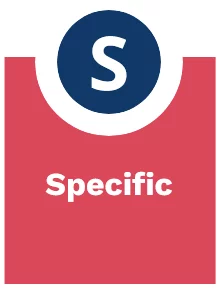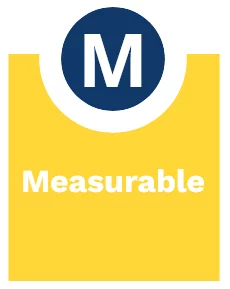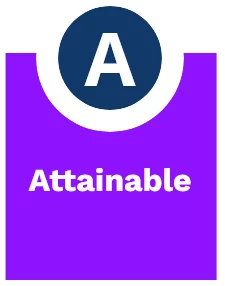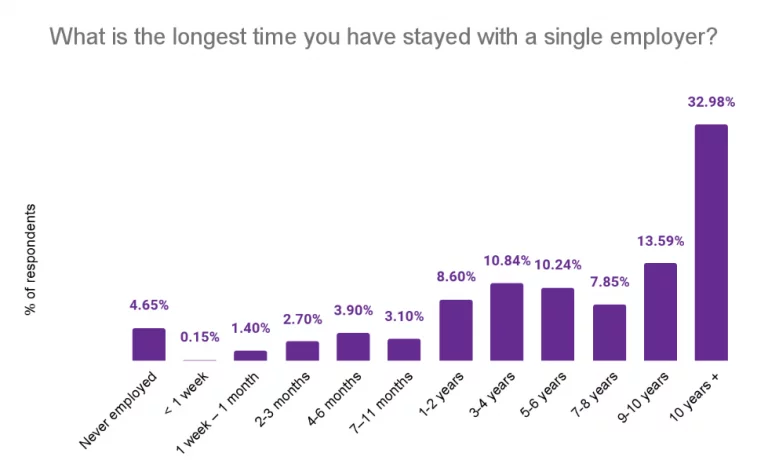
Setting SMART Goals (With 2 Examples!)
Contents
Goals provide a sense of purpose, direction, motivation, and focus.
SMART goals add extra dimensions to the goal-setting process.
This will help you set and achieve your goals every time.
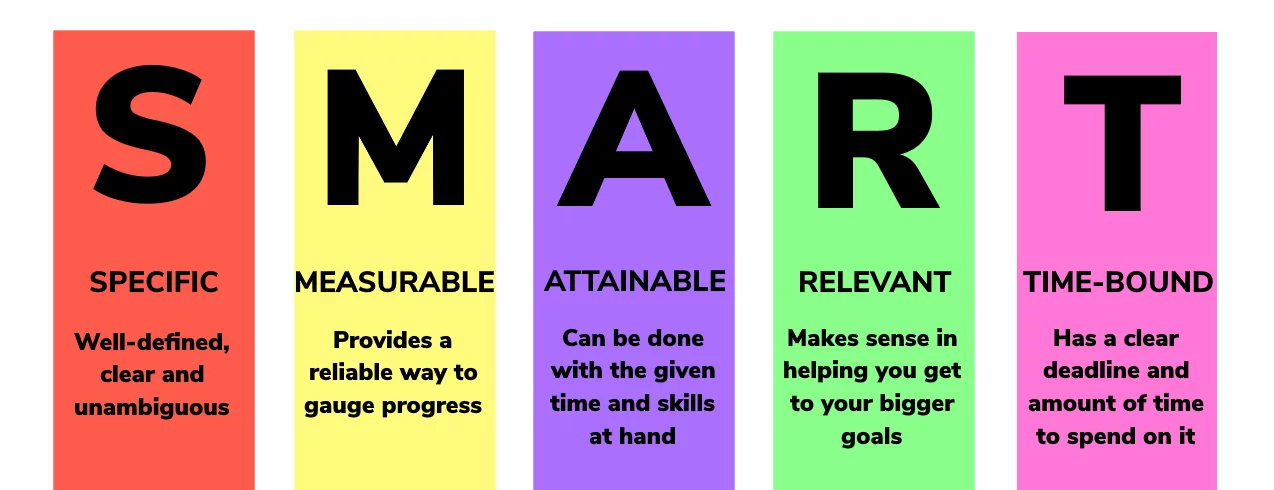
What Does SMART Stand for?
SMART is an acronym that stands for:
- Specific
- Measurable
- Attainable
- Relevant / Realistic
- Time-Bound
A SMART goal must meet all the criteria above.
It is designed to focus limited time and resources towards achieving critical objectives.
We’ll explore each aspect of the smart goal criteria below.
Specific
S in the SMART acronym stands for Specific.
A specific goal is well-defined, clear and unambiguous.
Consider the two objectives below:
- I want to get better at Excel.
- I want to learn and practice the typical functions in Excel within the next three months.
The first is ambiguous.
How will you know you’re getting better at Excel?
The second goal is more specific.
You want to learn and practice particular Excel Functions.
Setting specific goals requires asking the right questions.
Try asking the ‘w’ questions:
- Who – Who’s involved in the goal?
- What – What exactly do you wish to accomplish?
- When – When does your goal need to be accomplished?
- Which – Which prerequisites or requirements does the plan have?
- Why – Why is this goal important?
Measurable
M in the SMART goal acronym stands for Measurable.
A measurable goal provides a reliable way to gauge progress.
Most people fail to hit their goals because they don’t know what progress looks like.
For example, if your goal is to improve typing speed, you can measure progress by taking timed typing tests regularly.
Larger projects require regular milestones along the way that, when added up, lead to the achievement of your main goal.
To measure something, you need to use metrics.
Identify the most relevant metric and use it to measure your progress.
Measurement can be qualitative or quantitative such as:
- words per minute in typing
- monthly savings in cash
- client testimonials
- revenue generated.
Attainable
The A in SMART goal stands for Attainable.
An Attainable goal is a goal you can achieve given the available time, resources, and skills.
In evaluating attainability, look at your current resources, capabilities, and anything else you need to attain your goal.
A goal should inspire focus and motivation, not discourage you. If it’s too ambitious, you’ll lose morale along the way.
Ask yourself:
- How will I accomplish this goal?
- Do I have the skills and resources to make it happen?
- If not, how can I acquire them?
Let’s say you’re fascinated by space, and your goal is to go to the moon.
Is it possible? Yes, people have been to the moon before.
Is it Attainable? Probably not. Only 24 people have been to the moon, and no one has been there since 2013, so your odds aren’t good!
Relevant
R in the SMART acronym stands for Relevant or Realistic.
A goal should make sense in helping you to achieve your broader life and business goals.
So if you are building a new business, then a target relating to increasing sales would be relevant.
A target relating to your fitness would not be relevant to building a new business.
Try asking yourself:
Does this goal support the overall project?
If not, it may be more of a distraction than a step forward.
Time-Bound
T in the SMART goal acronym stands for Time-Bound or Timely.
A goal without a target date is simply a wish.
Setting a target date and a clear deadline creates a sense of urgency and focus.
Parkinson’s Law tells us that work expands to fill the time available. Without a deadline, your goal might take forever. Timeboxing is a well-established way to deal with this problem.
A deadline also offers an easy way to measure progress. Are you accomplishing the milestones you need to meet your goal on time?

Examples of SMART Goals
Here are two examples of smart goals:
Example #1: Getting to work on time
SMART goal:
I’ll arrive at work on time this month by setting my alarm 30 minutes earlier each morning and leaving the house 15 minutes earlier.
This goal is smart because it’s:
- Specific: Arrive for work on time every day
- Measurable: Arriving by 9 AM, waking 30 minutes earlier, and leaving the house 15 minutes early
- Attainable: Changes are mild and doable
- Relevant: Getting to work on time improves professional outlook
- Time-bound: Time frame is one month.
Being punctual is a great habit, especially for Interview Preparation!
Example #2: Grow sales
Original goal:
I want to grow sales.
This goal is not SMART.
It’s ambiguous and lacks measurable outcomes and timelines.
Applying the SMART goal process, we can restate it to:
I want to grow new sales to £500,000 within the next year by reaching out to 5 new prospects every week.
- Specific: Hit £500,000 in new sales
- Measurable: Sterling amount of sales closed and reach out to 5 prospects/week
- Attainable: £41,000 in new sales every month is Attainable
- Relevant: Improved sales means improved revenue for the business and a potential promotion at work
- Time-bound: Target is one year.
Final Thoughts
The SMART method is a critical tool in industrial and organisational psychology.
It was designed to help people achieve more with less.
SMART goals provide specificity allowing you to focus valuable time and resources on accomplishing your objectives.
The SMART goal method sidesteps procrastination, a significant cause of failure on most goals, by creating a sense of urgency.
SMART goals also provide an easy way to measure progress, helping you adjust when you fall behind.
For more management tips, come along and learn on our top rated line manager courses.
- Facebook: https://www.facebook.com/profile.php?id=100066814899655
- X (Twitter): https://twitter.com/AcuityTraining
- LinkedIn: https://www.linkedin.com/company/acuity-training/
